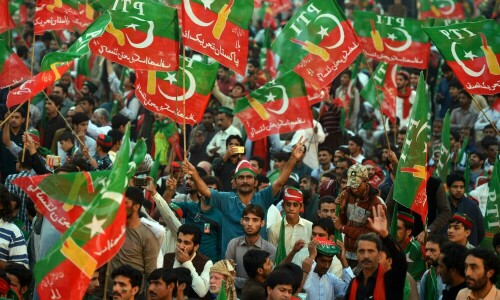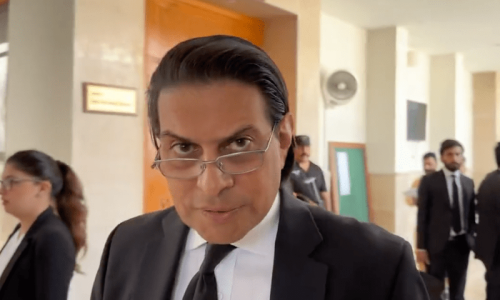ISLAMABAD: Just a few hours before the end of election campaigning, Pakistan Tehreek-i-Insaf (PTI) on Tuesday made a last-ditch effort by moving a petition before the Supreme Court, seeking a review of the court’s Jan 13 decision that upheld the Election Commission of Pakistan’s (ECP) action of depriving the party of its election symbol — ‘bat’.
Jointly moved by senior counsel Hamid Khan and Barrister Syed Ali Zafar, the petition has requested the apex court to declare the Dec 22, 2023 ECP’s decision to deprive the party of its chosen election symbol as illegal and, therefore, liable to be set aside.
The Supreme Court, being the apex court of the country, cannot and does not delve into factual controversies unless there is a substantial defect in the reading of evidence by the lower forum, the petition argued, explaining further that the top court’s intervention was warranted only when a significant flaw was identified, ensuring a judicious and restrained exercise of its jurisdiction.
Thus, the judgement has failed to take into account the freedom of association guaranteed under Article 17 and has essentially elevated and given greater importance to the statutory requirements contained in the Elections Act 2017, the petition emphasised. The consequence of the judgement is to effectively disenfranchise the voters of one of Pakistan’s largest political parties on the eve of general elections, and by doing so, it renders the freedom of association guaranteed under Article 17 merely illusory, the petition deplored.
Review petition says verdict neglects constitutional freedom of association; alleges ECP ‘bias’ impacting party’s election participation
Also, the Jan 13 verdict did not take into account ECP’s alleged zealous prosecution of cases against PTI and its founder Imran Khan on the one hand, whether in the case of contempt of the ECP, prohibited funding, or intra-party elections (IPEs), while complete inaction against other actors such as the erstwhile federal government, law enforcement agencies, and plainclothes policemen interfering in the functions of returning officers, as well as other political parties and their funding and IPEs, the petition alleged.
All this showed ECP’s contribution to attempting to exclude PTI from meaningful participation in the upcoming general elections. Thus, the judgement’s finding that the ECP was not victimising PTI is very clearly contrary to the record, the petition argued.
Even in the Dec 22 ECP order, there was no finding that the intra-party polls had not been held or conducted. Rather, the focus of the commission’s order was directed towards the validity of the appointment of the Federal Election Commission, which oversaw intra-party elections on Dec 2, 2022, in accordance with the PTI constitution of 2019.
At no point in the ECP petition before the SC, the commission explicitly disputed the occurrence of intra-party polls on Dec 2, as the crux of their contention rested solely on challenging the procedures, the PTI review petition argued.
The apex court, by taking up this question suo motu, has acted in contravention of Section 3 of the SC (Practice and Procedure) Act, 2023, which requires that matters invoking the original jurisdiction of the top court must be initially presented before a constituted committee for examination. Only upon the committee’s determination of a question of public importance related to the enforcement of the fundamental rights does the act authorise the constitution of a bench for adjudication, the petition argued.
Thus, the Jan 13 verdict under review erroneously holds that the ECP has the jurisdiction to act as a court of law and to adjudicate whether the IPE of a political party complied with the party’s constitution and to adjudicate upon any disputes between the members of the political party, the petition emphasised.
The sole basis contained in the Jan 13 short order was that if the court held that the ECP has no jurisdiction, then all provisions in the Elections Act 2017 requiring the holding of intra-party polls would be rendered ‘illusory’ and of no consequence and be redundant.
The petition contended that both the conclusion and the reasoning contained in the short order and the judgement under review were clearly erroneous, as the conclusion in the verdict was not supported by the text of the relevant provisions of the statute, i.e., Sections 208, 209, and 215 of the Elections Act.
None of the said sections conferred the powers on the ECP to independently review whether intra-party polls were held in accordance with a political party’s constitution or to adjudicate disputes between allegedly disputing members of a political party, it argued.
Published in Dawn, February 7th, 2024
To find your constituency and location of your polling booth, SMS your NIC number (no spaces) to 8300. Once you know your constituency, visit the ECP website here for candidates.














































Dear visitor, the comments section is undergoing an overhaul and will return soon.